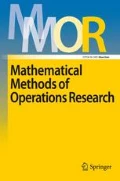Abstract
The paper surveys the complexity results for job shop, flow shop, open shop and mixed shop scheduling problems when the number n of jobs is fixed while the number r of operations per job is not restricted. In such cases, the asymptotical complexity of scheduling algorithms depends on the number m of machines for a flow shop and an open shop problem, and on the numbers m and r for a job shop problem. It is shown that almost all shop-scheduling problems with two jobs can be solved in polynomial time for any regular criterion, while those with three jobs are NP-hard. The only exceptions are the two-job, m-machine mixed shop problem without operation preemptions (which is NP-hard for any non-trivial regular criterion) and the n-job, m-machine open shop problem with allowed operation preemptions (which is polynomially solvable for minimizing makespan).
Similar content being viewed by others
References
Akers SB (1956) A graphical approach to production scheduling problems. Oper Res 4:244–245
Akers SB, Friedman J (1956) A non-numerical approach to production scheduling problems. Oper Res 3:429–442
Aho AV, Hopcroft JE, Ullman JD (1974) The design and analysis of computer algorithms. Addison-Wesley, Reading
Brucker P (1988) An efficient algorithm for the job-shop problem with two jobs. Computing 40:353–359
Brucker P (1994) A polynomial algorithm for the two machine job-shop scheduling problem with a fixed number of jobs. Oper Res Spekt 16:5–7
Brucker P, Jurisch B, Meyer W (1989) Geometric methods for solving the job-shop scheduling problem. Preprint Heft 127, Fachbereich Mathematik/Informatik, Universität Osnabrück
Brucker P, Kravchenko SA, Sotskov YuN (1994) On the complexity of two machine job-shop scheduling with regular objective functions. Oper Res Spect 16:5–7
Brucker P, Kravchenko SA, Sotskov YuN (1999) Preemptive job-shop scheduling problems with a fixed number of jobs. Math Methods Oper Res 49:41–76
Brucker P, Schlie R (1990) Job-shop scheduling with multipurpose machines. Computing, 45:369–375
Gonzalez T, Sahni A (1976) Open shop scheduling to minimize finish time. J Associat Comput Mach 23:665–679
Hardgrave WH, Nemhauser GL (1963) A geometric model and graphical algorithm for a sequencing problem. Oper Res 11:889–900
Johnson SM (1954) Optimal two- and three-stage production schedules with setup times included. Naval Res Logist Quart 1:61–68
Kravchenko SA, Sotskov YuN (1996) Optimal makespan schedule for three jobs on two machines. Math Methods Oper Res 43:233–238
Masuda T, Ishii H, Nishida T (1985) The mixed shop scheduling problem. Discr Appl Math 11:175–186
Servach VV (1983) On the Akers–Friedman problem. Upravljajemye Syst Novosibirsk 23:70–81 (in Russian)
Shakhlevich NV, Strusevich VA (1990) Scheduling two jobs in a multi-machine open shop to minimize an arbitrary regular penalty function. Report 9125/A, Erasmus University Rotterdam, The Netherlands
Shakhlevich NV, Sotskov YuN (1994) Scheduling two jobs with fixed and nonfixed routines. Computing 52:17–30
Shakhlevich NV, Sotskov YuN, Werner F (1999) Shop-scheduling problems with fixed and non-fixed machine orders of jobs. Ann Oper Res 92:281–304
Shakhlevich NV, Sotskov YuN, Werner F (2000) Complexity of mixed shop scheduling problems: A survey. Euro J Oper Res 120:343–351
Sotskov YuN (1985) Optimal scheduling of two jobs with a regular criterion. Institute of Engineering Cybernetics of the Academy of Sciences of BSSR, Minsk, pp. 86–95 (in Russian)
Sotskov YuN (1989) Complexity of scheduling with fixed number of jobs. Dokl Akad Nauk BSSR. 33:488–491 (in Russian)
Sotskov YuN (1990) Complexity of optimal scheduling of three jobs Kibernetika N 5:74–78 (in Russian)
Sotskov YuN (1991) The complexity of shop-scheduling problems with two or three jobs. Euro J Oper Res 53:326–336
Sotskov YuN, Shakhlevich NV (1990) NP-hardness of optimal scheduling three jobs. Vestsi Akad Navuk BSSR Ser Fiz-Mat Navuk 4:96–101 (in Russian)
Sotskov YuN, Shakhlevich NV (1995) NP-hardness of shop-scheduling problems with three jobs. Discr Appl Mathe 59:237–266
Strusevich VA (1986) On the possibility of constructing optimal makespan schedules for multi-stage systems with nonfixed routes. Vestsi Akad Navuk BSSR Ser Fiz-Mat Navuk 6:43–48 (in Russian)
Szwarc W (1960) Solution of the Akers-Friedman scheduling problem. Oper Res 8:782–788
Author information
Authors and Affiliations
Corresponding author
Rights and permissions
About this article
Cite this article
Brucker, P., Sotskov, Y.N. & Werner, F. Complexity of shop-scheduling problems with fixed number of jobs: a survey. Math Meth Oper Res 65, 461–481 (2007). https://doi.org/10.1007/s00186-006-0127-8
Received:
Accepted:
Published:
Issue Date:
DOI: https://doi.org/10.1007/s00186-006-0127-8




